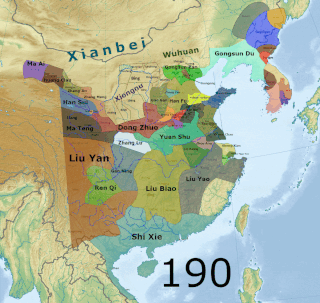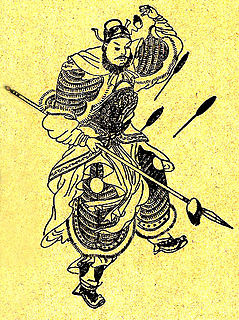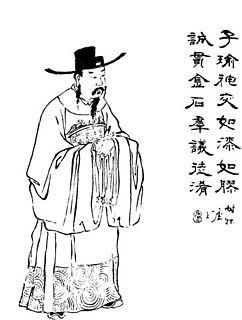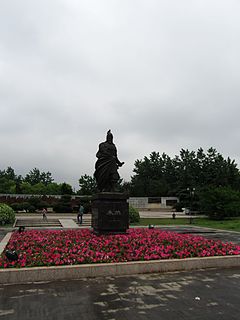Related Research Articles

The Three Kingdoms from 220 to 280 AD was the tripartite division of China among the states of Wei,Shu,and Wu. The Three Kingdoms period started with the end of the Han dynasty and was followed by the Jin dynasty. The short-lived Yan kingdom on the Liaodong Peninsula,which lasted from 237 to 238,is sometimes considered as a "4th kingdom".

Sun Quan,courtesy name Zhongmou (仲謀),formally known as Emperor Da of Wu,was the founder of the state of Eastern Wu during the Three Kingdoms period. He inherited control of the warlord regime established by his elder brother,Sun Ce,in 200. He declared formal independence and ruled from 222 to 229 as the King of Wu and from 229 to 252 as the Emperor of Wu. Unlike his rivals Cao Cao and Liu Bei,Sun Quan was much younger than they were and governed his state mostly separate of politics and ideology. He is sometimes portrayed as neutral considering he adopted a flexible foreign policy between his two rivals with the goal of pursuing the greatest interests for the country.

Romance of the Three Kingdoms is a 14th-century historical novel attributed to Luo Guanzhong. It is set in the turbulent years towards the end of the Han dynasty and the Three Kingdoms period in Chinese history,starting in 169 AD and ending with the reunification of the land in 280 by Western Jin. The novel is based primarily on the Records of the Three Kingdoms (三國志),written by Chen Shou.

Zhuge Liang,courtesy name Kongming,was a Chinese statesman and military strategist. He was chancellor and later regent of the state of Shu Han during the Three Kingdoms period. He is recognised as the most accomplished strategist of his era,and has been compared to Sun Tzu,the author of The Art of War. His reputation as an intelligent and learned scholar grew even while he was living in relative seclusion,earning him the nickname "Wolong" or "Fulong",meaning "Crouching Dragon" or "Sleeping Dragon". Zhuge Liang is often depicted wearing a Taoist robe and holding a hand fan made of crane feathers.

Zhang He,courtesy name Junyi,was a military general serving under the warlord Cao Cao in the late Eastern Han dynasty of China. He continued serving in the state of Cao Wei under its first two rulers,Cao Pi and Cao Rui,during the Three Kingdoms period until his death.
Cao Rui,courtesy name Yuanzhong,was the second emperor of the state of Cao Wei during the Three Kingdoms period. His parentage is in dispute:his mother,Lady Zhen,was Yuan Xi's wife,but she later remarried Cao Pi,the first ruler of Wei. Based on conflicting accounts of his age,Pei Songzhi calculated that,in order to be Cao Pi's son,Cao Rui could not have been 33 when he died as recorded,so the recorded age was in error;Lu Bi and Mou Guangsheng argued instead that Cao Rui was Yuan Xi's son.

Zhuge Jin,courtesy name Ziyu,was a Chinese military general and politician of the state of Eastern Wu during the Three Kingdoms period of China. Born in the late Eastern Han dynasty,Zhuge Jin started his career in the 200s as an official under the warlord Sun Quan,who later became the founding emperor of Eastern Wu in the Three Kingdoms period. In 215,he served as Sun Quan's representative in a territorial dispute over southern Jing Province between Sun Quan and his ally,Liu Bei. In 219,he joined Sun Quan's general LüMeng in an invasion of Liu Bei's territories in Jing Province after Sun Quan broke the Sun–Liu alliance. He was subsequently appointed as a general and commandery administrator. Before the Battle of Xiaoting of 221–222,Zhuge Jin attempted to dissuade Liu Bei from going to war with Sun Quan but was unsuccessful. The battle ultimately concluded with victory for Sun Quan's side;both sides made peace later and reestablished an alliance between the Eastern Wu and Shu Han states against their rival state,Cao Wei. From 222 until his death in 241,despite being rather incompetent in military affairs,Zhuge Jin served as one of Eastern Wu's top generals and participated in some battles against Cao Wei forces.

The military history of the Three Kingdoms period encompasses roughly a century's worth of prolonged warfare and disorder in Chinese history. After the assassination of General-in-chief He Jin in September 189,the administrative structures of the Han government became increasingly irrelevant. By the time of death of Cao Cao,the most successful warlord of North China,in 220,the Han empire was divided between the three rival states of Cao Wei,Shu Han and Eastern Wu. Due to the ensuing turmoil,the competing powers of the Three Kingdoms era found no shortage of willing recruits for their armies,although press-ganging as well as forcible enlistment of prisoners from defeated armies still occurred. Following four centuries of rule under the Han dynasty,the Three Kingdoms brought about a new era of conflict in China that shifted institutions in favor of a more permanent and selective system of military recruitment. This ultimately included the creation of a hereditary military class as well as increasing reliance on non-Chinese cavalry forces and the end of universal conscription.
Yue Jin,courtesy name Wenqian,was a military general serving under the warlord Cao Cao in the late Eastern Han dynasty of China. He was noted as much for his short stature as for his valour and ferocity on the battlefield. Yue Jin participated in most of Cao Cao's early military exploits,and gained multiple successes in the campaigns against LüBu,Liu Bei,remnants of the Yellow Turban rebels,and Yuan Shao and his associates. He was particularly praised as a capable vanguard,but his most famed accomplishment came with his supporting role in the defence of Hefei against Sun Quan's forces at the Battle of Xiaoyao Ford of 214–215.
Man Chong,courtesy name Boning,was a Chinese military general and politician of the state of Cao Wei during the Three Kingdoms period of China. He previously served under the warlord Cao Cao during the late Eastern Han dynasty. He is best known for defending the city of Hefei from a series of invasions by Wei's rival state,Eastern Wu,between 230 and 235.

Meng Da,courtesy name Zidu,was a military general of the state of Cao Wei during the early Three Kingdoms period of China. He previously served the warlords Liu Zhang and Liu Bei during the late Eastern Han dynasty before defecting to Wei. In Wei,he served under the first two rulers,Cao Pi and Cao Rui. Around late 227,he started a rebellion in Wei and aimed to rejoin the Shu-Han but the revolt was swiftly suppressed by the Wei general Sima Yi. Meng Da was captured and executed for treason.

Zhuge Ke,courtesy name Yuanxun,was a Chinese military general and politician of the state of Eastern Wu during the Three Kingdoms period of China. He was the eldest son of Zhuge Jin,a military general who served under Wu's founding emperor,Sun Quan. After Sun Quan's death in 252,Zhuge Ke served as regent for Sun Quan's son and successor,Sun Liang,but the regency proved to be militarily disastrous due to Zhuge Ke's aggressive foreign policy towards Wu's rival state,Cao Wei. In 253,he was ousted from power in a coup d'état and killed along with his family.
Wen Ping,courtesy name Zhongye,was a military general who lived during the late Eastern Han dynasty and Three Kingdoms period of China. During his tenure as a general under the warlord Cao Cao,he was credited with defeating the enemy general Guan Yu and defending Cao Cao's interests in Jiangxia Commandery from the eastern warlord Sun Quan.
Huang Quan,courtesy name Gongheng,was a military general of the state of Wei during the Three Kingdoms period of China. He previously served under the warlords Liu Zhang and Liu Bei during the late Eastern Han dynasty and in the state of Shu during the early Three Kingdoms period before defecting to Wei. Liu Bei relied heavily on Huang Quan for counsel in both domestic and foreign policy. Under the Wei government,however,Huang Quan was restricted to only internal affairs because even though the Wei emperor Cao Pi appreciated him for his talent,he doubted Huang Quan's allegiance and believed he was still secretly loyal to Liu Bei.

Zhu Ran,born Shi Ran,courtesy name Yifeng,was a Chinese military general of the state of Eastern Wu during the Three Kingdoms period of China. Despite being a childhood friend of Wu's founding emperor,Sun Quan,he was never given an important position or assignment before LüMeng's invasion of southern Jing Province in 219,wherein he assisted in capturing the enemy commander,Guan Yu. Following the Battle of Xiaoting,Wu's rival state,Cao Wei,launched a three-pronged strike on Wu's northwestern,middle,and eastern borders. Zhu Ran was sent to the northwestern border,where he defended the city of Jiangling with only 5,000 troops against an enemy force about ten times greater. He rose to fame and became feared throughout Wei. He then participated in a series of military operations against Wei,during which he defeated several enemy units,but the overall objectives were never met. Before his death,Zhu Ran was granted authority to oversee matters within the army.
Liu Shao,courtesy name Kongcai,was an official of the state of Cao Wei during the Three Kingdoms period of China. He often provided advice to the emperor Cao Rui,and was praised by Cao Rui for his good advice,even though Cao Rui did not frequently actually act on the advice. He also wrote poems to try to discourage Cao Rui from military and palace-building projects. When Sun Quan,the emperor of Wei's rival state Eastern Wu,led an army to attack the Wei stronghold at Hefei in 234,Liu Shao suggested to Cao Rui to send his forces to cut off Sun Quan's supply route rather than engage Sun Quan directly –a strategy that forced Sun Quan to withdraw.

The Chu Shi Biao refers to either of two memorials written by Zhuge Liang,the Imperial Chancellor of the state of Shu during the Three Kingdoms period of China. He presented them to Liu Shan,the second emperor of Shu. The first Chu Shi Biao,which is referred to as the "Former Chu Shi Biao",was presented in 227 before Zhuge Liang embarked on the first of a series of military campaigns against Shu's rival state,Wei. The second,known as the "Later Chu Shi Biao",was supposedly submitted in 228 before Zhuge Liang left for the second Northern Expedition.
The Battle of Hefei,also known as the Battle of Hefei Xincheng,was fought between the contending states of Cao Wei and Eastern Wu from roughly April to August 253 during the Three Kingdoms period of China.
The Battle of Hefei was fought between the states of Cao Wei and Eastern Wu in 231 during the Three Kingdoms period.
References
- Chen, Shou (3rd century). Records of the Three Kingdoms (Sanguozhi).
- Pei, Songzhi (5th century). Annotations to Records of the Three Kingdoms (Sanguozhi zhu).
- Sima, Guang (1084). Zizhi Tongjian .